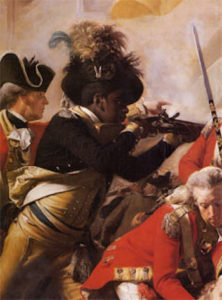
*Black Loyalists are celebrated on this date in 1775. They were African slaves who sided and fought with the British during the American Revolutionary War. They escaped the enslavement of Patriot masters and served on the Loyalist side because the Crown promised freedom. In November 1775, Lord Dunmore issued the controversial Lord Dunmore's Proclamation. As Virginia's royal governor, he called on all able-bodied men to assist him in the defense of the colony, including slaves belonging to the Patriots. He promised such slave recruits freedom in exchange for service in the British Army.
I do require every Person capable of bearing Arms to resort to His MAJESTY'S STANDARD or be looked upon as Traitors to His MAJESTY'S Crown and Government and thereby become liable to the Penalty the Law inflicts upon such Offences, such as forfeiture of Life, confiscation of Lands, &c. &c. And I do hereby further declare all indented Servants, Negroes, or others, (appertaining to Rebels,) free that are able and willing to bear Arms, they are joining His MAJESTY'S Troops as soon as may be, for the more speedily reducing this Colony to a proper Sense of their Duty, to His MAJESTY'S Crown and Dignity.
— Lord Dunmore's Proclamation, November 7, 1775
About 800 former slaves had fled to Norfolk, Virginia, to enlist within a month. Outraged Virginia slave owners decreed that a runaway slave would be executed. They also contradicted the British Army's promises by claiming that slaves who escaped to the British would be sold to sugar cane plantations in the West Indies. However, many slaves were willing to risk their lives for freedom. Lord Dunmore's Proclamation was the first mass emancipation of slaves in America. The 1776 Declaration of Independence refers indirectly to the Proclamation by citing it as one of its grievances, that King George III had "excited domestic Insurrections among us." An earlier version of the Declaration was more explicit, stating the following of King George III. Still, these controversial details were dropped during the final development of the document in Congress.
He is now exciting those very people to rise in arms among us and to purchase that liberty of which he has deprived them by murdering the people on whom he has obtruded them: thus, paying off former crimes committed against the Liberties of one people, with crimes which he urges them to commit against the lives of another.
— Draft Declaration of Independence, 1776
After the war began, several British generals issued proclamations calling for Loyalists to free their slaves so that they could join the undermanned British army and bolster its numbers. Among those issuing proclamations were John Murray, 4th Earl of Dunmore, Governor of Virginia, and Sir Henry Clinton. Jamaica's Governor John Dalling drafted a proposal in 1779 for enlisting a regiment of mulattoes and another unit of free Negroes.
Some 3,000 Black Loyalists were evacuated from New York to Nova Scotia; they were individually listed in the Book of Negroes as the British gave them certificates of freedom and arranged their transportation. The Crown gave them land grants and supplies to help them resettle in Nova Scotia. Some European Loyalists who emigrated to Nova Scotia brought their slaves, making for an uneasy society.
One historian has argued that those slaves should not be regarded as Loyalists, as they had no choice in their fates. Other Black Loyalists were evacuated to London or the Caribbean colonies. Thousands of African slaves escaped from plantations and fled to British lines, especially after the British occupation of Charleston, South Carolina. When the British evacuated, they took many former slaves with them. Many ended up among London's black poor, with 4,000 resettled by the Sierra Leone Company to Freetown in Africa in 1787.
Five years later, another 1,192 Black Loyalists from Nova Scotia chose to emigrate to Sierra Leone, becoming known as the Nova Scotian settlers in the new British colony of Sierra Leone. Both waves of settlers became part of the Sierra Leone Creole people and the founders of the nation of Sierra Leone. Thomas Jefferson called the Black Loyalists "the fugitives from these States." While most Black Loyalists gained freedom, some did not. Those recaptured by slave traders were sold back into slavery and treated harshly for serving under the British.